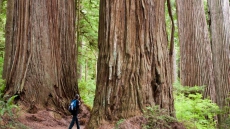Barnacles produce the strongest glue or cement found in nature. The material is better than anything we have developed synthetically and sticks to any surface, even underwater.
But exactly how this superglue works has been a mystery - until now.
Considered a nuisance to the shipping industry, barnacles grow on hard surfaces like piers, boats, rocks, and on other animals such as turtles and whales.
A team of scientists from Newcastle University in Britain has shown how barnacle larvae release an oily droplet to clear the water from surfaces before sticking down using a phosphoprotein adhesive.
Barnacles have two larval stages - the nauplius and the cyprid.
"We have known for a while there are two components to the bioadhesive. But that still left the question, how does the glue contact the surface in the first place if it is already covered with water," said Nick Aldred, a member of the research team.
"We now know that these two substances play very different roles - one clearing water from the surface and the other cementing the barnacle down." he added.
Barnacles are one of the major cause of Biofouling, the accumulation of marine life on ship's hulls, which increases drag on ships,
The discovery will help in the development of bioadhesives and also help scientists produce new anti-fouling coatings for ships, the study said.
The findings were published in the journal Nature Communications.





